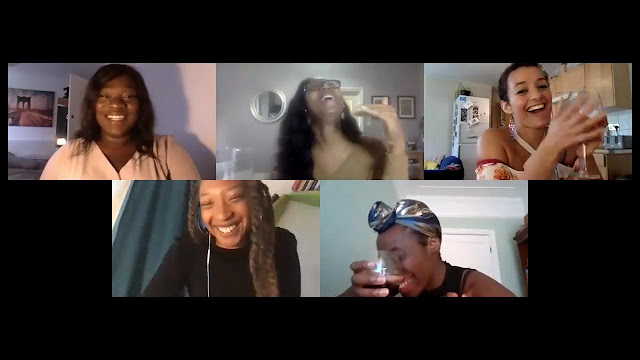Review: "#Charlottesville" and "Black Women Dating White Men" at East to Edinburgh Goes Virtual Festival
East to Edinburgh Goes Virtual
Presented by 59E59 Theaters via https://59e59.org/
July 15-25, 2021
 |
| (top, l-r) Christelle Belinga, Clara Emanuel, Risha Silvera, (bottom, l-r) Arianne Carless, and Merryl Ansah in BLACK WOMEN DATING WHITE MEN |
In the first of two pieces on the festival, we look at #Charlottesville and Black Women Dating White Men, a pair of plays constructed verbatim from interviews. While the focus of the latter might seem in some ways much broader than that of the former, in both works, individual experiences open up onto and illuminate larger social issues.
Visit us tomorrow for more from East to Edinburgh Goes Virtual 2021!
#Charlottesville
Written and performed by Priyanka Shetty
Directed by Joe Bishara
Produced by Abbey Theater of Dublin
 |
| Priyanka Shetty in #CHARLOTTESVILLE. Photo by David Crone |
The play posits the interviews as a way to understand what happened around the 2017 Unite the Right white supremacist rally and why, as well as to move beyond the city's abstracted existence as a hashtag. Shetty plays not only herself but also the interviewees, delineating them as individuals as she shifts from one to another, assisted by shifts in the lighting that accompany changes in speakers. The interviewees' roots in Charlottesville range from having come there for college to being able to measure family residence in centuries, and other differences, in demographics and situation, produce, say, views of underlying class and racial tensions where others see only small-town friendliness. The speakers talk about the months leading up to the rally, including white supremacist presence; the refusal of officials to prevent the rally based on provided evidence; and police inaction once things had gotten underway (a contrast to residents stepping up to defend a Black neighborhood). During the play's most affecting section, Shetty plays the mother of Heather Heyer, whose daughter was killed in an act of domestic terrorism of the kind that the right has been working on legalizing ever since. The play does not neglect the lingering emotional and psychological effects on residents and how their view of their city (and perhaps country) has changed.
The production employs a minimal set—a desk area to one side and some seats to the other—and only once, and with fitting deliberateness, does Shetty add to her all-black ensemble. Projected tweets serve as structural markers, and there is very sparing use of recorded lines of dialogue and still photos at a couple of key points. But the fabric of the production is woven from the words of the residents. And the fact that the city finally took down its statues of Robert E. Lee and "Stonewall" Jackson on July 10, four years after the events that #Charlottesville addresses, shows that their story isn't over yet.
Black Women Dating White Men
Written by Somebody Jones
Directed by Khadifa Wong
Produced by Somebody Jones and Khadifa Wong
 |
| (top l-r) Christelle Belinga, Merryl Ansah, Clara Emanuel, (bottom l-r) Risha Silvera, Arianne Carless in BLACK WOMEN DATING WHITE MEN |
This transnational group of women touches on topics including the reactions of others—whether family, community, or strangers in the street—some of which change over time and some of which depend on geography (as well as social topographies); the effects of disjunctions in lived experience between them and their partners; how they are received differently alone and with their partner; and what drew them to their partners in the first place. Much more is covered in their wide-ranging conversations, all delivered via excellent, extremely naturalistic performances by the cast. The cast's lively interchange and undeniable chemistry (bolstered in no small part by the reactions to whoever is speaking) lend the approximately 40-minute production a captivating immediacy, a sense that you have wandered into a thoughtful, entertaining gathering of real-life friends who can speak freely with one another and know that they will be understood (even if not always agreed with). If you're looking to make a commitment, Black Women Dating White Men is a keeper.
-John R. Ziegler and Leah Richards



Comments
Post a Comment